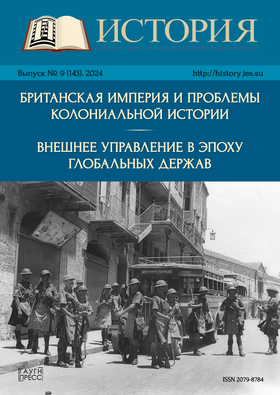
Share
Part I. The British Empire and the Problems of Colonial and Neocolonial History (ed. by Marina Ayzenshtat)
The history of the British Empire, the largest colonial empire in world history, has consistently attracted the attention of domestic and foreign scientists. Their interest was dictated by the desire to identify the reasons and stages of its creation, the peculiarities of the nature of government, the origin of the liberation movement, the reasons for the collapse and others. Modern Russian historiography is characterized not only by the search for new approaches when addressing the traditional problems of colonial history, but also by a significant expansion of the problems of its research, thanks, among other things, to the involvement of new sources.
The innovative searches of Russian historians are reflected in articles covering the colonial and neocolonial history of Britain from the turn of the 15th — 16th centuries to the present. Their authors are employees of the Institutes of the Russian Academy of Sciences and teachers of Russian universities, who focused on controversial and poorly covered problems. Such as finding an answer to questions about the origins of the strength of the empire, the specifics of early English expansion, the attitude of the British to the expansion of possessions, to the inhabitants of other continents. As well as economic policy and management of the empire
Part II. External Governance in the Era of Global Powers: Legal Regimes and (Neo)Colonial Control (ed. by Andrey Larin, Stanislav Malkin)
The era of empires was accompanied not only by inter-state competition and territorial seizures. The projection of power of its key players in the international arena assumed, along with the growth of their military and political presence, the establishment of various legal regimes for the functioning of the colonial order. In the articles proposed in the block, the management practices of global powers are analyzed on specific historical examples of redefining the legal framework of external management of this type. The authors' research focuses on the legal mechanisms of the crisis management in the colonies (goals, objectives, parameters of the martial law and emergency regime), features of regulation of public and religious institutions, legislative models of colonial administration, options for the application of legal mechanisms to solve specific tasks of empire-building, discussions about transformation of international law in the era of world wars and other issues related to the legal aspects of the functioning of the global world order in a given thematic framework. Such a research perspective allows us to raise the question of the evolution of the colonial order, mechanisms, forms and ways of transformation of global empires of Modern and Contemporary times in a new way.
